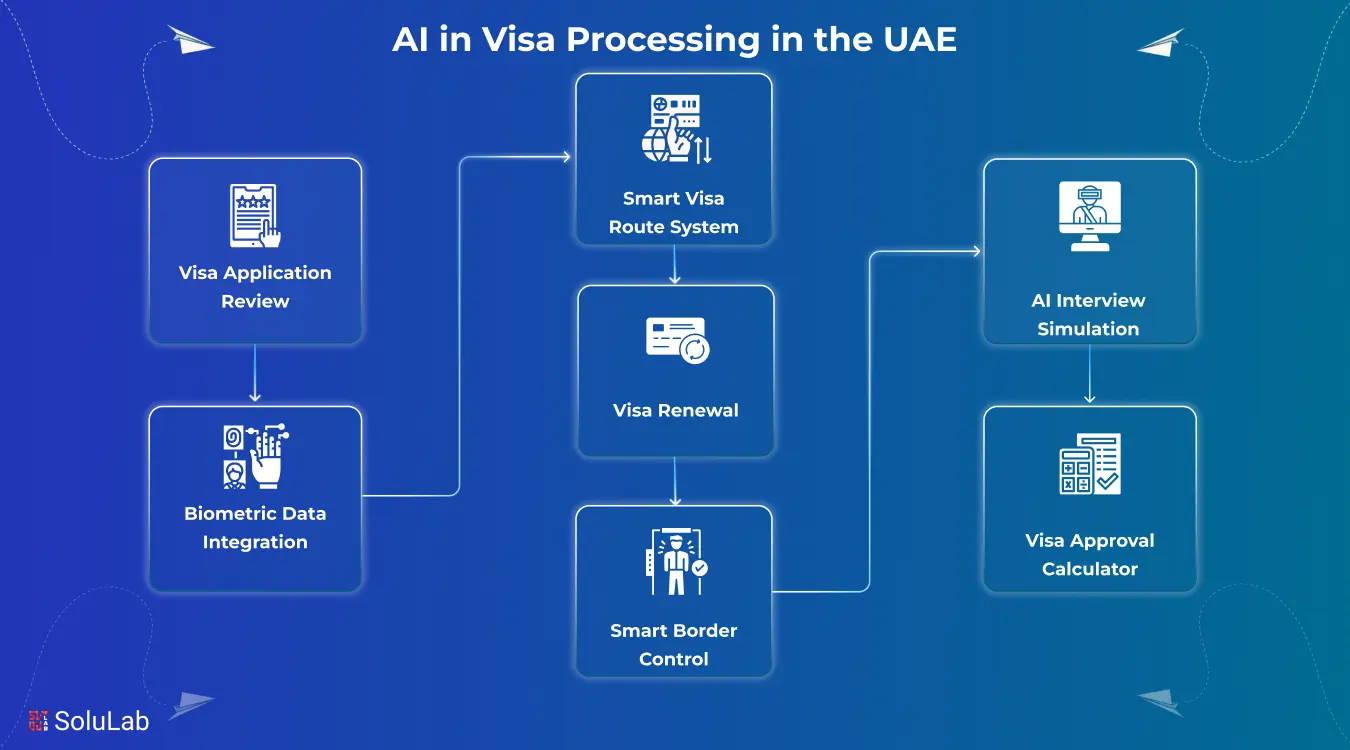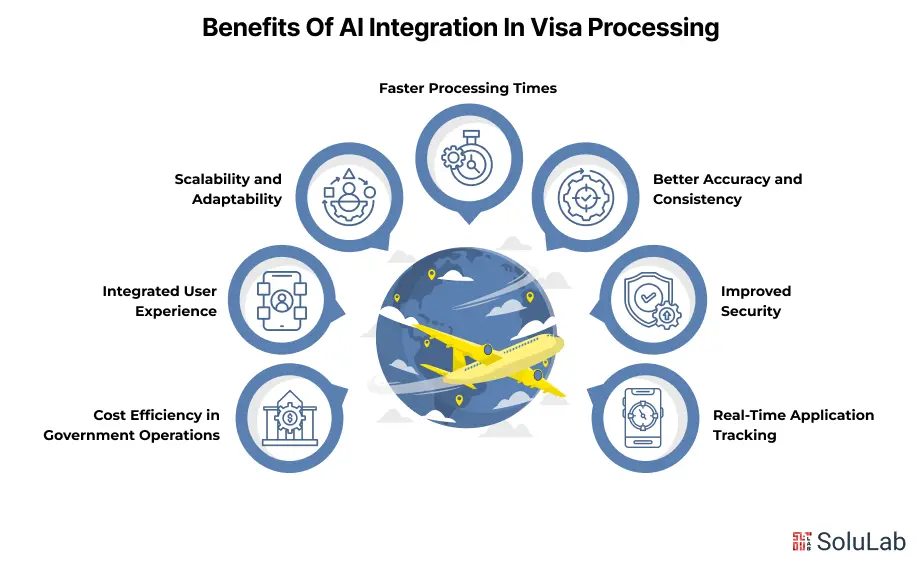
The application of artificial intelligence (AI) is causing a major change in the United Arab Emirates’ (UAE) visa application procedures. According to the UAE National Strategy for Artificial Intelligence 2031, the UAE wants to become a global leader in AI by that time. AI technology is upgrading multiple sectors, and immigration and visa services are not an exception. The goal is to increase productivity, reduce processing times, and improve the entire application experience.
The UAE’s comprehensive economic strategy demonstrates its commitment to AI. By 2031, the country’s GDP is expected to increase by around $91 billion due to AI. In addition to streamlining the visa application process, this emphasis on AI positions the UAE as a pioneer in incorporating leading-edge technology into public services.
This blog will look at the role of AI in visa sponsorship and approvals in the UAE, discussing the problems it helps with, the benefits it offers, and the potential effects on the country’s immigration policies in the future.
Challenges AI Solved in Traditional Visa Processing Systems
Traditional visa processing systems usually provide a number of difficulties that make the process slow, prone to mistakes, and ineffective. Applicants may experience delays, misunderstandings, and dissatisfaction due to manual data entry, document validation, and unpredictable decision-making.
However, these issues are being addressed by the growing use of AI in visa processing in the UAE, which is improving the system and making it more reliable for both authorities and applicants. Below are certain challenges addressed by artificial intelligence in visa processing systems:
-
Errors in Manual Data Entry
By automating data extraction, AI minimizes human mistakes, hence assuring the correctness of information input into the system.
-
Processing Speed
AI solutions can efficiently handle significant quantities of applications, hence reducing waiting times and accelerating the total application procedure.
-
Excessive Documentation
AI systems can autonomously analyze and verify papers for precision, alleviating the strain of handling extensive volumes of paperwork for authorities.
-
Document Verification
Artificial intelligence can authenticate passports and other essential papers by cross-referencing them with international databases, therefore reducing fraud.
-
Managing High Application Volumes
AI is scalable, allowing it to manage substantial increases in visa applications without sacrificing speed, hence enhancing system efficiency.
-
Forecasting Trends
Artificial intelligence can predict demand using past data, enabling immigration authorities to prepare and deploy resources for high application periods proactively.
-
Mitigating Bias in the Procedure
AI algorithms are engineered to assess applications utilizing data, so facilitating a more equitable procedure that eliminates human prejudice.
-
Improved Security
By using advanced detection algorithms to identify fake applications, artificial intelligence improves the security of the visa application process while preserving the reliability of the system.
Read Also: How to Select the Best Crypto Development Company in the UAE?
Benefits of AI Integration in Visa Processing in the UAE

The UAE has made significant strides in improving its visa processing system by incorporating advanced technology. As the country continues to attract a growing number of travelers, workers, and tourists, AI integration into the visa system has helped make the entire process faster, more reliable, and easier for everyone involved.
The development of AI-driven platforms like Visarun.ai, which streamline the visa application procedure, is noteworthy as these technologies speed up the approval process. As evidence of the growing investment, Visarun.ai has already secured $700,000 to promote its AI-driven visa application system.
Here are some of the benefits that come with this technological shift:
-
Faster Processing Times
In the past, visa applications often involved long delays due to manual processing and data entry. By automating these steps, the visa process has become much faster. With the ability to handle multiple applications at once, the system now significantly reduces waiting times.
-
Better Accuracy and Consistency
Traditional visa systems often suffer from human errors, particularly when dealing with large amounts of data. AI minimizes these issues by consistently following established criteria and thoroughly checking every detail. This has led to more accurate decision-making.
-
Improved Security
Security is a key concern in any visa processing system. AI helps address this by verifying submitted documents against international databases, and quickly identifying discrepancies or fraudulent information. This added layer of security ensures that only valid applications are processed.
-
Real-Time Application Tracking
In the past, applicants had to wait in the dark for updates on their visa status. With AI, applicants can now track their applications in real-time, receiving prompt updates throughout the process. This transparency makes the process much easier for applicants.
-
Cost Efficiency in Government Operations
Automating many parts of the visa process means that fewer human resources are needed to handle routine tasks. This allows government agencies to allocate resources more effectively, reducing costs while still maintaining a high level of efficiency.
-
Integrated User Experience
AI has streamlined the entire experience for applicants. By automating repetitive tasks, applicants spend less time on paperwork and can navigate the process more easily. With faster processing times, clearer communication, and a more efficient system.
-
Scalability and Adaptability
AI technology can handle an increased volume of applications, especially during peak times, without slowing down. This scalability ensures that the visa processing system can adapt to growing demand, making it ideal for managing high volumes of applications year-round.
The integration of AI-powered visa services in the UAE has not only improved efficiency and security but also enhanced the experience for applicants. As the technology continues to evolve, it promises to make the visa application process for top AI development companies even faster and more secure, positioning the UAE as a global leader in immigration services.
How is AI Transforming Visa Processes in the UAE?
The UAE has always been at the forefront of innovation, and its visa processing system is no exception. With the increasing number of travelers coming to the country for business, tourism, or work, the UAE has turned to technology to make the visa process more efficient and secure.
1. Visa Application Review
The system has been upgraded with automated tools that can quickly review applications. These systems verify the information provided by applicants, reducing the chances of errors and ensuring a smoother, quicker approval process. This use of technology helps save time and ensures that applicants’ information is processed more accurately.
2. Biometric Data Integration
By incorporating fingerprints, facial recognition, and other biometric information, the UAE can confirm applicants’ identities much faster and with greater security. This artificial intelligence visa system allows for a seamless process, ensuring that only legitimate applications are approved. The integration of biometrics has amplified the system’s security and has greatly improved the speed with which travelers are processed.
3. Smart Border Control
With smart border systems, travelers no longer have to wait in long lines to have their documents checked manually. Instead, AI-enabled kiosks verify travelers’ passports and biometric data automatically, speeding up the process and ensuring better security. This innovation has not only made the border experience quicker but also far more secure.
4. Visa Renewal
AI-driven systems can analyze an applicant’s history and determine if they qualify for renewal automatically. This reduces the need for applicants to submit physical paperwork or attend in-person appointments, saving both time and effort. The renewal process is now much more efficient and hassle-free.
5. Smart Visa Route System
Navigating the complex world of visa categories can be daunting, but the UAE’s Smart Visa Route System simplifies it. This system uses AI to assess each applicant’s travel history, purpose of visit, and other factors to recommend the most appropriate visa option. This ensures that applicants are guided in the right direction.
6. AI Interview Simulation
With AI in visa services, applicants now have access to AI-driven interview simulations. These tools mimic real-life interviews and help applicants practice their responses. By receiving feedback and suggestions, applicants feel more confident and are better prepared for the actual interview, ensuring they are ready when the time comes.
7. Visa Approval Calculator
Many applicants are unsure about their chances of visa approval, but the visa approval calculator addresses this uncertainty. By analyzing several factors such as previous travel history, financial status, and the purpose of the visit, this tool estimates the likelihood of a successful application, making the visa process clearer.
The Role of AI in Travel and Tourism
The impact of AI extends far beyond the visa application process. AI in travel and tourism is reshaping how travelers plan their trips to the UAE. From personalized hotel and flight recommendations to real-time travel information, AI enhances the overall travel experience. It provides travelers with tailored experiences that match their preferences, making the UAE a more attractive destination for visitors.
AI-powered chatbots are another breakthrough that enhances the visa application experience. These chatbots provide 24/7 assistance, answering questions about visa requirements, processing times, and application status. Applicants can receive immediate responses to their inquiries, eliminating the need for long wait times or multiple calls.
The integration of AI into the UAE’s visa processing system is making a profound impact. By leveraging AI in visa services, the country is ensuring faster processing, greater security, and an overall better experience for travelers. As these technologies evolve, the UAE will continue to lead the way in making visa processing easier, transparent, and user-friendly.
How AI in Visa Processing is Being Used Globally?
Countries around the world are increasingly turning to technology to enhance their visa processing systems. The integration of AI has made significant strides in improving efficiency, security, and overall convenience for travelers and immigration authorities alike.
Several countries, including the UAE, Australia, the US, the UK, and others, are leading the way in utilizing these advanced technologies:
1. United Arab Emirates
The UAE has embraced AI in visa processing to address the growing demand and ensure efficiency. The government has introduced AI in visa services that automate document verification and application reviews, which drastically reduces processing times and minimizes human error. Additionally, AI assistants are available to answer traveler inquiries 24/7, providing quick responses and guiding applicants through the necessary steps.
2. Australia
In Australia, AI is being used to enhance the visa processing system by automatically assessing applicants’ qualifications and ensuring that they meet all the necessary criteria. The use of AI tools in assessing risk factors and background checks. Moreover, Australia’s artificial intelligence visa technology allows biometric data, such as facial recognition, to be used for a faster and more secure entry process.
3. United States
The US has adopted AI systems that streamline the entire visa application process. AI is used to quickly verify applicants’ documents, reducing the chances of fraud. These technologies also enhance the review of an applicant’s history, allowing authorities to make quicker and more informed decisions. The integration of AI in travel has not only simplified the visa process but also strengthened security.
4. United Kingdom
The UK is also seeing the benefits of AI in its visa processes. By automating document reviews and creating smarter systems for evaluating visa applications, the government has been able to speed up the process. AI tools that assess risk and security are being incorporated into border control systems as well, allowing the UK to process travelers more efficiently.
5. Canada
Canada uses AI-driven solutions to make its visa and immigration processes more efficient. AI systems are employed to assess visa applications and analyze biometric data, reducing human intervention and speeding up processing times. The automation of these processes has greatly enhanced the overall experience for applicants while also improving security measures, ensuring compliance with immigration laws.
6. New Zealand
New Zealand has integrated AI into its visa processing systems, particularly in assessing the eligibility of applicants for various visa categories. AI systems are used to analyze applicants’ travel histories, employment status, and other factors to determine the best visa options. These smart-systems help New Zealand handle a higher volume of applications while maintaining high levels of accuracy and security.
7. Singapore
In Singapore, AI is helping streamline the visa application process by automating document verification and using biometric data for identity confirmation. This innovation has led to faster processing times and improved security measures, making Singapore one of the most efficient countries in visa applications. The integration of AI in travel and tourism further enhances the travel experience by offering personalized recommendations and services to visitors.
8. South Korea
South Korea has adopted AI technology to improve the efficiency and accuracy of its visa processing system. By using AI-powered systems that analyze biometric data, the country has enhanced security and speed at its borders. AI systems are also used to detect fraudulent applications, ensuring that only legitimate travelers are granted entry. This has made South Korea’s visa processing one of the fastest and most secure in the region.
All in all, countries globally are beginning to recognize the power of AI systems in transforming the way they manage immigration and visa processing. As these technologies continue to evolve, more nations are adopting AI to reduce wait times, minimize human error, and improve the security of the entire process.
Barriers to AI-Driven Visa Processing in the UAE
The UAE has implemented AI-driven solutions to streamline visa processing, but there are still several challenges to overcome. Understanding them is essential for improving and refining the system as it continues to evolve.
1. Data Privacy and Security Concerns
With AI-powered applications handling sensitive personal information, there are heightened concerns over how this data is stored, processed, and protected. If not managed carefully, there could be risks of data breaches or misuse, which could undermine trust in the entire visa processing system.
2. Integration with Legacy Systems
Many government agencies still rely on older, legacy systems for visa processing. Integrating these systems with new AI workflow automation technologies can be complex and costly. Migrating from traditional manual processes to AI-driven platforms requires not only technological adjustments but also employee training and new infrastructure.
3. Ethical Concerns and Bias
AI systems, while designed to be neutral, can sometimes perpetuate biases present in the data they are trained on. If the data used to train AI models for visa applications is not diverse enough or includes biases, the system may inadvertently disadvantage certain applicants. This can lead to concerns over fairness and equality in the visa approval process.
4. High Implementation Costs
The initial investment in developing AI-powered applications can be expensive. Governments must invest in AI technology, infrastructure, and skilled personnel to manage the transition from traditional processes to AI-driven solutions. These upfront costs, along with the ongoing maintenance and training requirements, can be a significant barrier.
5. Regulatory Challenges
The legal landscape surrounding AI is still evolving. There are few established guidelines for the use of AI in immigration processes, which can create uncertainty for governments and applicants alike. An AI development company can help provide the technical expertise needed to navigate these challenges otherwise, the widespread adoption of AI-powered applications in visa processing may face delays.
6. Public Acceptance and Trust
For AI to be effective in visa processing, public trust is paramount. Many applicants may feel uncomfortable or distrustful of AI-driven decisions, especially when it comes to sensitive matters like immigration. Governments need to build trust with the public by providing transparency on how AI is used in visa processing and ensuring that the technology is applied responsibly.
Despite these challenges, the UAE is well-positioned to overcome them with the help of innovative AI development companies. As AI continues to evolve, the barriers to its integration into visa processing will likely diminish.
The Future of AI in Immigration
The UAE is moving towards a more efficient visa and immigration process by incorporating advanced technology. With the use of AI in visa processing, the country is able to speed up the review of applications, reducing human errors and ensuring faster, more reliable results. This shift makes the process easier for both applicants and immigration officials.
As AI-powered applications become more common, they’re helping to further automate and simplify tasks like document verification and background checks. These tools are designed to handle more work without compromising accuracy.
The introduction of AI-powered chatbot development has also made a significant impact. These chatbots provide around-the-clock assistance to applicants, helping them navigate the process and answer common questions.
Conclusion
The future of visa and immigration processes in the UAE is undoubtedly set for an exciting transformation. With the adoption of advanced technologies, the system is becoming more streamlined, faster, and secure, benefiting both applicants and government authorities.
As a leading AI development company, SoluLab plays a significant role in driving these advancements. Their expertise in developing custom AI solutions has helped businesses like Digital Quest, a travel service provider. SoluLab partnered with Digital Quest to create an AI-powered ChatGPT system that improves user interaction and offers tailored travel recommendations, enhancing communication and engagement for customers.
If you’re looking to transform your business with the latest technology AI solutions, SoluLab is here to help. Get in touch with us today to start your journey toward innovation!
FAQs
1. How is AI improving the visa application process in the UAE?
AI is helping speed up the visa application process by automating tasks such as document verification, background checks, and data entry. This reduces human error and ensures faster and more accurate processing, making the entire experience more efficient.
2. What role do AI-powered applications play in visa processing?
AI-powered applications streamline the visa process by automating routine tasks like reviewing documents and checking eligibility. These applications help reduce manual work, speed up processing times, and improve accuracy, making the system more efficient and user-friendly for applicants.
3. How are chatbots enhancing the visa application experience?
Chatbot development is enhancing the experience by providing 24/7 support to applicants. These AI-powered chatbots can answer questions, guide users through the application process, and offer real-time assistance, making the process more convenient and reducing the workload for immigration staff.
4. Are there any security concerns with using AI in visa processing?
While AI improves efficiency and security in visa processing, it’s important to ensure that proper safeguards are in place to protect sensitive data. Data privacy and secure processing systems are essential to prevent breaches and ensure the confidentiality of applicants’ personal information.
5. How can businesses benefit from AI in the immigration and travel industries?
Businesses can enhance their services by adopting AI technology to automate and streamline their operations. AI can provide personalized recommendations, improve customer engagement, and make processing more efficient. Companies in the travel industry, such as Digital Quest, are already partnering with AI development companies like SoluLab to implement AI-driven solutions that improve user experience and business operations.






